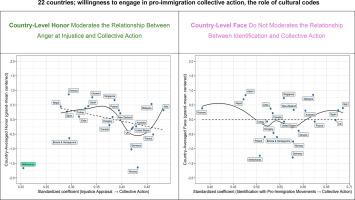荣誉、面子和尊严的文化逻辑在群体过程与支持移民的集体行动意图之间的关系中起调节作用
IF 2.2
Current research in ecological and social psychology
Pub Date : 2025-01-01
DOI:10.1016/j.cresp.2025.100234
引用次数: 0
摘要
虽然群体认同、有效性和不公正评价是公认的集体行动支持的预测因素,但很少审查背景因素。我们通过使用来自22个国家(N = 4615)的数据,测试国家层面的规范是否调节了认同、对不公正的愤怒和效力与支持支持移民团结集体行动之间的关系,从而解决了这一疏忽问题。鉴于强调荣誉和面子的文化优先考虑和谐和社会凝聚力而不是冲突,我们预计荣誉准则和面子取向会减弱身份、不公正和效力与集体行动支持之间的联系。结果表明,在大多数国家,对不公正的认同、效力和愤怒与集体行动意图有关,但荣誉守则减弱了愤怒与集体行动意图之间的关系。我们进一步讨论了这些结果在支持移民的态度和行动的跨文化研究的影响和局限性。总的来说,我们的发现通过提出潜在的文化约束,补充了对集体行动预测因素和集体行动双室模型的研究。本文章由计算机程序翻译,如有差异,请以英文原文为准。

Cultural logics of honor, face, and dignity as moderators of the relationship between group process and pro-migrant collective action intentions
Although group identification, efficacy, and injustice appraisals are well-established predictors of collective action support, contextual factors are rarely examined. We address this oversight in preregistered study by testing whether country-level norms moderate the relationships identity, anger at injustice, and efficacy have with support for pro-immigrant solidarity collective action using data from 22 countries (N = 4615). Given that cultures that emphasize honor and face prioritize harmony and social cohesion over conflict, we expected that honor codes and face orientation would attenuate the links identity, injustice, and efficacy have with collective action support. Results showed that identification, efficacy, and anger at injustice were linked to collective action intentions in most countries, but honor codes attenuated the relationship between anger and collective action intentions. We further discuss the implications and limitations of these results in light of cross-cultural studies of pro-immigrant attitudes and actions. Overall, our findings complement research on predictors of collective action and the dual-chamber model of collective action by presenting potential cultural constraints.
求助全文
通过发布文献求助,成功后即可免费获取论文全文。
去求助
来源期刊

Current research in ecological and social psychology
Social Psychology
CiteScore
1.70
自引率
0.00%
发文量
0
审稿时长
140 days
 求助内容:
求助内容: 应助结果提醒方式:
应助结果提醒方式:


